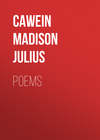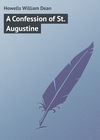Kitabı oku: «Years of My Youth», sayfa 13
XI
We young men of that time were mostly Republicans, but some of us were Democrats and some of us were Southerners, or derivatively Southern. I have said how little society with us was affected by New England, even in such a custom as Thanksgiving, and I may go a little farther and say how it was characterized for good as well as for evil by the nearer South rather than the farther East, but more for good than for evil. Many people of Southern origin among us had chosen a Northern home because they would rather live in a Free State than a Slave State; they had not cast their sectional patriotism, but when it came to a question of which ideal should prevail, they preferred the Northern ideal. They derived from that South which antedated the invention of the cotton-gin, and which could take a leading part in keeping the Northwestern Territory free, with Ohio the first Free State born of that great mother of Free States. The younger generation of their blood were native Ohioans, and these were not distinguishable from the children of the New-Englanders and the Scotch-Irish Pennsylvanians by anything that I can remember. We had already begun to be Ohioans, with an accent of our own, and I suppose our manners were simpler and freer than those of the East, but the American manners were then everywhere simple and free, and are so yet, I believe, among ninety-nine hundred-thousandths of our ninety-nine millions. It seems to me now that the manners in Columbus were very good then among the young people. No one can say what change the over-muchness of subsequent money may have made in them, but one likes to think the change, if any, is not for the better. There seems to have been greater pecuniary equality then than there is now; there was an evener sky-line, with scarcely a sky-scraping millionaire breaking it anywhere. Within what was recognized as society there was as much social as pecuniary equality; apparently one met the same people everywhere on that easily ascertained level above the people who worked for their living with their hands. These were excluded, as they always have been excluded from society in all times and places; so that if I had still been a compositor at the printer’s case I could not have been received at any of the houses that welcomed me as a journalist, though that did not occur to me then, and only just now occurs to me, as something strange and sad; something that forever belies our democracy, but is so fast and deep-rooted in the conditions which our plutocracy has kept from our ancestral monarchies and oligarchies and must keep as long as men live upon one another in the law of competition.
In one house there was more singing and playing and in another more reading and talking. All the young ladies were beautiful, with the supremacy of that young lady whom it was our poetry to hold so beautiful that no other might contest it. As I believe the use still is in the South, we called them Miss Lilly, Miss Julia, Miss Sally, Miss Fanny, Miss Maggie, whether they were the older or the younger daughters of the family. We were always meeting them at parties or, failing that or including that, we went to call upon them at their houses. We called in the evening and it was no strange thing for a young man to call every evening of the week, not at one house, but at three or four. How, in the swift sequence of the parties, we managed so often to find the young ladies at home remains one of the mysteries which age must leave youth to solve. Possibly in that sharply foreshortened perspective of the past the parties show of closer succession than they really were.
At most of the houses we saw only the young ladies; it was they whom we asked for; but there were other houses where the mothers of the family received with the daughters, and at one of these my welcome was immediately of a kindness and always of a conscience which it touches me to realize. I was taken at the best I meant as well as the best I was by the friend who was the exquisite spirit of the house, and made me at home in it. My world had been very small, and it has never since been the greatest, but I think yet, as I divined then, that she was of a social genius which would have made her in any great-worldlier capital the leader she was in ours, where her supremacy in that sort was no more questioned than the incomparable loveliness of that most beautiful girl whom every one worshiped. Her house expressed her, so that when her home finally changed to another the new house obeyed the magic of her taste and put on the semblance of the first, with a conservatory breathing through it the odor of her flowers and the murmur of the dove that lived among them: herself a flower-like and birdlike presence, delicate, elegant, such as might have been fancied of some fine, old-world condition in a new-world reading of it. She lived to rule socially in a community which attested its gentleness by its allegiance to her until she was past eighty, but when I knew her first she was too young to be titularly accepted as their mother by her stepdaughters and was known to them as their cousin in what must have been her own convention; but I suppose she liked to be not less than sovereign among her equals. With me she was not only the kindest, but the most candid of my friends; my literary journalism and later my literature may have been to her liking, but she never flattered me for them when, as I now know, too much praise had made me hungry for flattery. No young man such as I was then could have had a wiser and faithfuler friend, and I render her memory my tribute after so many years from a gratitude which cannot be spoken. After so many years I cannot make out whether she accepted or merely suffered my extreme opinions in politics; though she was wholly Ohioan, her husband’s family had close affiliations with the South; but hers was certainly a Republican house, as nearly all the houses I frequented were. What may have made her even anticipatively my friend was our common acceptance of the Swedenborgian philosophy, which long, long afterward, the last time I saw her, I spoke of as a philosophy. But then she rejected the notion with scorn; it might be a pleasant fancy, she said, but a philosophy, no; and I perceived that she had come the way of that agnosticism which the whole cultivated world had taken. Now I have heard that in her last years she went back to the faith which was perhaps more inherited than reasoned in both of us. But I am sure that it was at first a bond and that she was conscientiously true to this bond of a common spiritual tradition, when upon some public recognition of my work she reminded me how according to Swedenborg every beautiful thing we said or did was by an influx from the divine. I submitted outwardly, but inwardly I rebelled: not that my conceit of the things I did was so very great; I believe I thought rather modestly of myself for doing them, and I always meant to do much better things; in fact I still have my masterpiece before me; but, poor things as they were, I wished to feel them wholly mine.
For a kindred reason I quite as altogether refused, and more explicitly, the theory of my old friend, Moncure D. Conway, as to the true function of the West in literature. He was then a young Unitarian minister, preaching at Cincinnati an ever-widening liberalism in religion, and publishing a slight monthly magazine named after The Dial of Emerson at Concord, and too carefully studied from it. For this paler avatar of that transcendental messenger he had asked me for contributions, and so a friendship, which lasted throughout our lives, sprang up between us. When he once came to Columbus he came to lunch with me, and quite took my appetite away by propounding his theory that the West was to live its literature, especially its poetry, rather than write it, the East being still in that darkling period when it could not live its literature. I do not remember the arguments by which he supported his thesis; but proofs as of holy writ could not have persuaded me of it as far as I myself was concerned. My affair was to make poetry, let who would live it, and to make myself known by both the quality and quantity of my poetry. It is not clear to me now how I declared my position without immodesty, but somehow I declared it, and so finally that Conway was very willing to carry away with him for his magazine a piece of rhyme which I had last made. He could the more willingly do this because The Dial was one of those periodicals, commoner then than now, that paid rather in glory than in money; in fact it was not expected to pay anything in money, so that I doubly defeated him: I was not only not living my poetry, I was not even living by it.
IV
THE days of the years when youth is finding its way into manhood are not those which have the most flattering memories. It is better with the autobiographer both before and after that time, though both the earlier and later times have much to offer that should keep him modest. But that interval is a space of blind struggle, relieved by moments of rest and shot with gleams of light, when the youth, if he is fortunate, gathers some inspiration for a worthier future. His experiences are vivid and so burnt into him that if he comes to speak of them it will require all his art to hide from himself that he has little to remember which he would not much rather forget. In his own behalf, or to his honor and glory, he cannot recall the whole of his past, but if he is honest enough to intimate some of its facts he may be able to serve a later generation. His reminiscences even in that case must be a tissue of egotism, and he will merit nothing from their altruistic effect.
I
Journalism was not my ideal, but it was my passion, and I was passionately a journalist well after I began author. I tried to make my newspaper work literary, to give it form and distinction, and it seems to me that I did not always try in vain, but I had also the instinct of actuality, of trying to make my poetry speak for its time and place. For the most part, I really made it speak for the times and places I had read of; but while Lowell was keeping my Heinesque verses among the Atlantic MSS. until he could make sure that they were not translations from Heine I was working at a piece of realism which when he printed it in the magazine our exchange newspapers lavishly reprinted. In that ingenuous time the copyright law hung loosely upon the journalistic consciousness and it was thought a friendly thing to reproduce whatever pleased the editorial fancy in the periodicals which would now frowningly forbid it, but with less wisdom than they then allowed it, as I think. I know that as its author the currency of The Pilot’s Story in our exchanges gave me a joy which I tried to hide from my senior in the next room; and I bore heroically the hurt I felt when some of the country papers printed my long, overrunning hexameters as prose. I had studied the verse not alone in Longfellow’s “Evangeline,” but in Kingsley’s “Andromeda,” and Goethe’s “Hermann and Dorothea,” while my story I had taken from a potentiality of our own life, and in the tragedy of the slave girl whose master gambles her away at monte on a Mississippi steamboat, and who flings herself into the river, I was at home with circumstance and scenery. I still do not think the thing was ill done, though now when I read it (I do not read it often) I long to bring it closer to the gait and speech of life. The popularity of the piece had its pains as well as pleasures, but the sharpest anguish I suffered was from an elocutionist who was proposing to recite it on the platform, and who came to me with it to have me hear him read it. He did not give it with the music of my inner sense, but I praised him as well as I could till he came to the point where the slave girl accuses her master with the cry of —
“Sold me! Sold me! Sold! And you promised to give me my freedom!”
when he said, “And here I think I will introduce a shriek.” “A shriek?” I faltered. “Yes, don’t you think it would fill the suspense that comes at the last word ‘Sold!’? Something like this,” and he gave a screech that made my blood run cold, not from the sensibility of the auditor, but the agony of the author. “Oh no!” I implored him, and he really seemed to imagine my suffering. He promised to spare me, but whether he had the self-denial to do so I never had the courage to inquire.
In the letters to my sister which I was so often writing in those Columbus years I find record of the constant literary strivings which the reader shall find moving or amusing as he will. “I have sold to Smith of the Odd Fellow’s Monthly at Cincinnati that little story I read to you early last summer. I called it ‘Not a Love Story.’ He gave me six dollars for it; and he says that as soon as I have time to dress up that translation which B. rejected he will buy that. At the rate of two dollars a page it will bring me sixteen or eighteen dollars. ‘Bobby’ ” – I suppose some sketch – “is going the rounds of the country papers. The bookseller here told our local editor that it was enough to make anybody’s reputation – that he and his family laughed prodigiously over it… I have the assurance that I shall succeed, but at times I tremble lest something should happen to destroy my hopes. I think, though, that my adversity came first, and now it is prosperity lies before me. I am going to try a poem fit to be printed in the Atlantic. They pay Fullerton twenty-five dollars a page. I can sell, now, just as much as I will write.”
It was two years yet before that poem I was trying for the Atlantic was fit, and sold to the magazine for twenty-five dollars, though it was three pages long. I was glad of the pay, but the gain was nothing to the glory; and with the letter which Lowell wrote me about it in the pocket next my heart, and felt for to make sure of its presence every night and morning and throughout the day, I was of the potentiality of immeasurable success. I should have been glad of earning more money, for there were certain things I wished to do for those at home which I could not do on my salary of ten dollars a week, already beginning to be fitfully paid. Once, I find that I had not the money for the white gloves which it seems I expected myself to wear in compliance with usage at a certain party; and there were always questions of clothes. Dress-coats were not requisite then and there; the young men wore frock-coats for the evening, but I had ambitiously provided myself with the other sort upon the example of a friend who wore his all day; I wore mine outdoors once by day, and then presciently dedicated it to evening calls. The women dressed beautifully, to my fond young taste; they floated in airy hoops; they wore Spanish hats with drooping feathers in them, and were as silken balloons walking in the streets where men were apt to go in unblacked boots and sloven coats and trousers. The West has, of course, brushed up since, but in that easy-going day the Western man did not much trouble himself with new fashions or new clothes.
II
Whether the currency of The Pilot’s Story and the Atlantic publication of my Heinesque poems added to my reputation in our city I could not say. It was the belief of my senior on the newspaper that our local recognition was enervating and that it had better go no farther, but naturally I could not agree with a man of his greater age and observation, and it is still a question with me whether recognition hurts when one has done one’s best. I cannot recall that I ever tried to invite it; I hope not; but certainly I worked for it and hoped for it, and I doubt if any like experiment was ever received with more generous favor than ours by a community which I had reasons for knowing was intelligent if not critical. Our paper, if I may say it, was always good society, but after a while and inevitably it became an old story, or at least an older story than at first, though it never quite ceased to be good society. There remained the literary interest, the æsthetic interest for me, after the journalistic interest had waned; there was always the occasion, or the occasion could always be made. Passages in those old letters home remind me that we talked long and late about The Marble Faun one night at a certain house; at another we talked about other books from nine o’clock on, I imagine till midnight. At another the young lady of the house “sang about a hundred songs.” At still another the girl hostess said, “You haven’t asked me to sing to-night, but I will sing,” and then sang divinely half the night away, for all I know. There was a young lady who liked German poetry, and could talk about Goethe’s lyrics; and apparently everywhere there were the talking and the laughing and the singing which fill the world with bliss for youth.
Perhaps I sacrifice myself in vain by my effort to impart the sense of that past which faded so long ago; perhaps some readers will hold me cheap for the fondness which recurs to it and lingers in it. But I believe that I prize its memories because they seem so full of honor and worship for the girlhood and womanhood which consecrate it in my remembrance. Within this gross world of ours as it now is, women are still so conditioned that they can lead the life of another and a better world, and if they shall ever come to take their rightful share of the government of the world as men have made it I believe they will bring that other and better world of theirs with them and indefinitely advance the millennium. I have the feeling of something like treason to the men I knew in that time, when I own that I preferred the society of women to theirs, but I console myself with the reflection that they would probably have said the same as to mine. Our companionship could hardly have chosen itself more to my liking. It was mainly of law students, but there was here and there one engaged in business, who was of a like joking and laughing with the rest. We lived together in a picturesque edifice, Gothic and Tudor, which had been meant for a medical college, and had begun so, and then from some financial infirmity lapsed to a boarding-house for such young men as I knew, though we were not without the presence of a young married pair, now and then, and even a young lady, a teacher or the like, who made us welcome when we ended a round of evening calls outside by calling on them from room to room. In my boyhood days at Columbus I was sometimes hustled off the sidewalk by the medical students coming from the College, then in its first prosperity, and taking up the whole pavement as they swept forward with interlinked arms. This was at noontime, when they were scarcely less formidable than the specters which after dark swarmed from the dissecting-room, and challenged the boy to a trial of speed in escaping them. Now the students had long been gone from the College and I dwelt in its precincts with such other favorites of fortune as could afford to pay three dollars and a half a week for their board. The table was even super-abundant, and the lodging was almost flatteringly comfortable after experience of other places. I can only conjecture that the rooms we inhabited had been meant for the students or professors when the College was still a medical college. They were large, and to my untutored eye, at least, were handsome, and romantically lighted by windows of that blend of Tudor and Gothic which I have mentioned, but their architecture showed more on the outside than on the inside, and of course the pinnacles and towers of the edifice were more accessible to the eye without. It was the distinction of people who wished to be known for a correct taste to laugh at the architecture of the College, and perhaps they do so still, but I was never of these. For me it had, and it has, a charm which I think must have come from something like genius, if not quite genius, in the architect, to whose daring I would like to offer this belated praise. At any rate it was the abode of entire satisfaction to me in those happy years between 1857 and 1860 when I could not have wished other companionship than I had there.
There could have been no gayer table than we kept, where we made the most of one another’s jokes, and were richly personal in them, as youth always is. The management was of the simplest, but not incompatible with dignity, for the landlord waited upon the table himself, and whoever the cook might be, the place was otherwise in the sole charge of an elderly maid, with a curious defect of speech, which kept her from answering, immediately or ultimately, any question or remark addressed to her. We valued her for this impediment because of the pathetic legend attaching to it, and we did not value her the less, but the more, because she was tall and lank and uncouth of face and figure, though of a beauty in her absolute faithfulness to her duties and the kindness beyond them which she always showed. The legend was that in her younger if not fairer time she had been married, and when one day her husband, suddenly killed in an accident, was brought home to her, she tried to speak, but could not speak, and then ever afterward could only speak after great stress, and must often fall dumb, and go away without speaking.
I do not know whether we really believed in this or not, but we behaved as if we did, and revered the silent heroine of the tragedy as if it were unquestionably true. What kept me from trying to make it into a poem I cannot say, but I would like to think it was that I felt it above rather than below the verse of even the poet I meant to be. How many rooms she had charge of I could as little say, but I am certain that there were two of us young men in each of them. My own room-mate was a poet, even more actual than myself, though not meaning so much as I to be always a poet; he was reading law, and he meant to practise it, but he had contributed two poems to the Atlantic Monthly before any of mine had been printed there. This might have been a cause of bitterness with me; his work was certainly good enough to be a cause of bitterness, and perhaps I was not jealous because I felt that it would be useless; I should like to believe I was not even jealous of him for being so largely in society before I was. Later, when we came in from our evening calls, we sometimes read to each other, out of what books I could not say now, but probably some poet’s; certainly not our own verse: he was too wise for that and I too shy.
He was then reading law, and sometime in my middle years at Columbus he left us to begin his law practice farther West. In noticing his departure as a friendly journalist should I obeyed his wish not to speak of him as a poet; that, he said, would injure him with his new public; but whether it would or not I am not sure; the Western community is sometimes curiously romantic, and does not undervalue a man for being out of the common in that way. What really happened with him was that, being of a missionary family and of a clerical tradition, he left the law in no great time and studied divinity. It was a whole generation afterward before I saw him again; and now his yellow hair and auburn beard of the early days were all one white, but his gentle eyes were of the old hazel, undimmed by the age that was creeping upon us both. He had followed me with generous remembrance and just criticism in my fiction; and again he made me a sort of professional reproach for dealing in my novels (notably in A Modern Instance) with ethical questions best left to the church, he thought. I thought he was wrong, but I am not sure that I so strenuously think so now; fiction has to tell a tale as well as evolve a moral, and either the character or the principle must suffer in that adjustment which life alone can effectively manage. I do not say ideally manage, for many of the adjustments of life seem to me cruel and mistaken. If it is in these cases that religion can best intervene, I suppose my old friend was right; at any rate, he knows now better than I, for he is where there is no manner of doubt, and I am still where there is every manner of doubt.
I believe, in the clerical foreshadowing of his future, perhaps, he was never of those wilder moments of our young companionship when we roamed the night under the summer moon, or when we forgathered around the table in a booth at the chief restaurant, and over a spirit-lamp stewed the oysters larger and more delicious than any to be found now in the sea; or when, in the quarter-hours of digestion which we allowed ourselves after our one-o’clock dinner we stretched ourselves on the grass, often sunburnt brown, before the College and laughed the time away at anything which pretended itself a joke.
We collegians were mostly Republicans as most of the people we knew were. A few young men in society were not, but they were not of our companionship, though we met them at the houses we frequented, and did not think the worse of them for being Democrats. In fact, there was no political rancor outside of the newspapers, and that was tempered with jocosity. Slavery had been since the beginning of the nation, the heritage of the states from the colonies, and it had been accepted as part of the order of things. We supposed that sometime, somehow, we should be rid of it, but we were not sanguine that it would be soon; and with so many things of pressing interest, the daily cares, the daily pleasures, the new books, the singing and laughing and talking in the pleasant houses, I could leave the question of slavery in abeyance, except as a matter of paragraphing. There had been as many warnings of calamity to come as ever a people had. There had been the breaking of solemn promises from the South to the North; there had been the bloody fights between the sections in Kansas and the treacheries of the national government; there had been the quarrels and insults and violences in Congress; there had been the arrests and rescues of fugitive slaves; there had been the growth of hostile opinion, on one side fierce and on the other hard, maturing on both sides in open hate. There had been all these portents, and yet when the bolt burst from the stormy sky and fell at Harper’s Ferry we were as utterly amazed as if it had fallen from a heaven all blue.



















